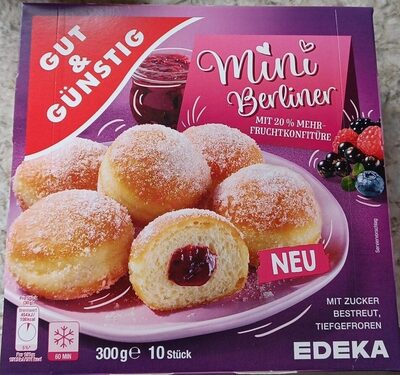
Barcode: 4311501739143
Mini Berliner
DOUBTFUL
📝 Reason: This product includes religiously uncertain substances that could be Halal or Haram. Definitive classification requires more detailed production information.
🏷️ Category: Snacks, Sweet Snacks, Biscuits And Cakes
📄 Certificates: Nutriscore, Nutriscore Grade D
Ingredients:
Details
Understanding the Halal Status of Mini Berliner
The Mini Berliner pastry is a delightful sweet snack loved by many. However, for those following a halal diet, understanding its halal status is crucial. Currently, the halal status of Mini Berliner has been deemed DOUBTFUL. This classification indicates that some ingredients may not meet halal requirements based on traditional interpretations of halal practices.
What Makes the Mini Berliner Halal Status Doubtful?
The classification of ‘doubtful’ stems primarily from certain ingredients that are present in the product. While many components are permissible in Islam, others remain ambiguous, mainly due to the lack of clarity regarding their sourcing or processing methods. To make informed decisions, we need to delve deeper into the ingredient list.
Dissecting the Ingredients of Mini Berliner
The Mini Berliner is made up of several components, which we will analyze individually:
- Yeast dough (wheat flour): Generally permissible unless cross-contaminated.
- Whole egg: Completely permissible in Islam.
- Water: Also permissible in Islam.
- Margarine (plant fats including palm and coconut): The halal status of palm oil can be ambiguous due to issues surrounding sustainable sourcing, but it is usually permissible.
- Rapeseed oil: Permissible in Islamic dietary laws.
- Emulsifier: mono- and diglycerides of fatty acids: Typically derived from halal sources but can sometimes be questionable.
- Lecithins: Generally considered permissible.
- Acidifier: citric acid: Usually made from non-animal sources, this is permissible.
- Yeast: Halal-friendly ingredient.
- Sugar: Permissible as it is a plant-derived ingredient.
- Table salt: Also permissible.
- Lactose: While derived from milk, it may not be a concern if from halal-certified plants.
- Sweet whey powder: Often derived from cheese-making, its halal status can be questionable based on the source.
- Wheat starch: Permissible since it is derived from wheat.
- Mono- and diacetyl tartaric acid esters of mono- and diglycerides of fatty acids (E334): This additive is typically used as a stabilizer and isn’t directly harmful but lacks clarity on sourcing.
- Mixed fruit jam: Generally permissible ingredients.
- Glucose-fructose syrup: Generally permissible but often requires clarity on sourcing.
- Thickening agent: pectins: Plant-derived, thus permissible.
E-Numbers and Their Halal Status
Several additives and E-numbers exist within the product; here are the key focal points:
- E334 (mono- and diacetyl tartaric acid esters): This is categorized under antioxidants and stabilizers. While they are permissible, their derivation needs to be verified.
Brand and Certificate Context
Interestingly, the Mini Berliner falls under the category of Snacks, Sweet Snacks, Biscuits, and Cakes. It currently holds a Nutriscore Grade D, indicating it’s not the healthiest option. However, when it comes to halal certifications, it lacks specific certification attesting to its halal status, contributing to the current doubt surrounding its consumption among observant Muslims.
Final Thoughts
In conclusion, the halal status of the Mini Berliner is doubtful due to the inclusion of various ingredients, some of which lack clear halal certifications. Those who strictly adhere to halal dietary laws might want to avoid this product unless more detailed information about its production and sourcing is provided. Always consult reliable halal certification bodies or local Islamic authorities for confirmation.
